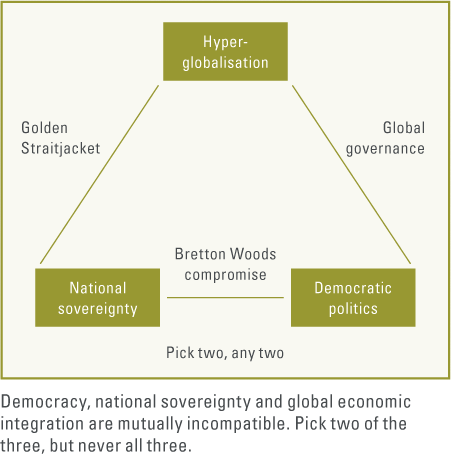Global Growth, Local Governance
ETHOS Issue 09, June 2011

What has the world learned from the financial crisis?
We have learnt – or relearnt – one very useful lesson, which is that markets are not self-regulating, self-stabilising nor self-legitimising. In order for markets to function, they need to be complemented by a broad range of effective non-market institutions, governance structures, and supervised by mechanisms to ensure accountability and legitimacy. Financial regulation, supervision, consistency and coherence in fiscal policy: all of these are still necessary.
The problem is that this may lead to the wrong implication – that just because we have realised that we need these institutions, the way to go about it is to create them globally: this is neither a practical nor desirable agenda, partly because globally negotiated governance tends to be very limited, based on the lowest common denominator of what is possible, and dominated by the needs of the largest players and most vocal groups. The best and most sound financial regulations are likely to be those based on domestically determined and implemented rules, which will differ from country to country, and for good reasons.
Instead, what we need to think about is how to create traffic rules to prevent regulatory arbitrage and other spillovers that may undermine the soundness of these individual sets of rules – that is a very different kind of thinking from how the world is going about it right now by trying to pursue a global governance agenda.
What issues are potential causes for concern in the post-crisis global economy?
I worry that there has been a steady loss of legitimacy and credibility in our existing trade arrangements: reflecting a steady divide between what the elites and the common people feel, as well as a reluctance on the part of the elites and economists to accept that there is a core of legitimate grievance that is not simply a matter of ignorance and narrow self- interest.
For instance, the question of global multinationals (MNCs) throws these tensions into sharp relief. MNCs want to have common global standards because this is an efficient way to reduce the cost of doing business across borders, for the same reason that international banks want global financial standards and not nationally determined ones. This would not be a big issue if everybody in domestic economy were as equally mobile as the multinationals. As a result, there is a very big divide in most modern societies between groups that perceive themselves as globally mobile and therefore view their opportunities and remuneration as set by what is happening in the world (i.e. capitalists and highly-skilled professionals), and the vast majority of most people, who are not globally mobile and whose livelihoods are determined by what happens in the domestic economy.
There has been a steady loss of legitimacy and credibility in our existing trade arrangements.
The tension is due to the fact that democratically-led governments have to pay attention to the skilled professionals and capitalists, yet also have to listen to the mass majority of the electorate who are not as mobile.
The issue is that if you resolve this tension systematically and routinely in the direction of the interests of the mobile class and the multinationals, you will have a big problem on your hands. The obstacle today is how to rework the bargain, instead of what governments have been doing – which is to cave in to the multinationals and say we have no alternatives or we will lose these multinationals. The situation becomes a golden straitjacket. But I think this is not a sustainable path for healthy democracies, and is a source of the legitimacy problems I have pointed out.
FIGURE 1. THE POLITICAL TRILEMMA OF THE WORLD ECONOMY

How can global institutions play a role?
The issues of international trade, international finance and the global economy are very different from those of climate change, terrorism or health pandemics. With climate change, each country pursuing its own narrow interests will lead to global disaster; with world trade, however, if you let countries pursue policies that are best for them, the aggregate collectively is not a bad outcome, but a healthy global economy where countries are growing, there are moderately open policies and the world is prospering as a whole.
Clearly there are issues, such as the global macroeconomic imbalance, that call for some element of global coordination: because each country cannot independently pursue its own current account target, nor can every country pursue its own exchange rate target independent of others. Nevertheless, I would not like to see institutions such as the WTO move towards being a global setter of standards. Instead, the agenda should be more about creating mutually consistent policy space, rather than about negotiation of market access which is much more diluted in terms of potential benefits.
Nevertheless, there are good reasons why we need to preserve room for economies to have their own independent monetary and fiscal policy: the business cycle is unlikely to be perfectly synchronised; there are differences in labour market and product market structures across different countries, which will mean different trade offs; and different countries will have different preferences for inflation.
To what extent can small, open economies negotiate the terms of globalisation relative to their domestic needs?
There is no need to buy into the discourse that globalisation is an imperative in the face of which we have no choices. Globalisation is a man-made concept: while technological progress has indeed made it easier to move goods, transfer funds and make transactions in ways that make us more globally integrated, how it determines policy is a social and political construct. To what extent and on what terms are you integrated into the world economy?
There are good reasons why we need to preserve room for economies to have their own independent monetary and fiscal policy.
Countries which are smart globalisers have always left some room for themselves to manoeuvre. For example, Sweden is not a member of the Eurozone and its flexibility in controlling its own exchange rate has been a great boon to them in recovering from the crisis.
In terms of labour markets, there is the question of how much globalisation to accept and what is being given up in return. The countries that have been the most successful in avoiding dramatic problems in this area are countries that have had very self-conscious domestic provisions alongside their globalisation strategy, such as the Nordic countries and Singapore, where policies for social redistribution and other provisions help moderate some of the underlying tensions. Of course, there will still be tensions: Taxing labour to reduce demand is inefficient; at the same time, globally mobile professionals are more able to avoid the taxation which is needed to fund social safety nets. The erosion of the tax base becomes an issue.
There is the question of how much globalisation to accept and what is being given up in return.
Clearly, a small country can still have a domestic economic development strategy or industrial policy, as well as its own levels of social provision: Singapore today would be very different if it had not chosen to do so. Being a small country does change the trade-offs: for instance, in terms of industrial policy, you do not have the capability to have a very wide portfolio of large experiments; therefore you would want to try to select investments, projects and industry niches that are on average smaller in size than those of a larger country to still have a reasonable spread – otherwise you are gambling too much on a few big projects. Unless the industry you have chosen to invest in has very strong scale economies, smaller countries can find success in niches where they need not be overshadowed by the efforts of larger countries.
What principles should policymakers adopt when planning for economic development in a globalised world?
First, it helps to have very concrete goals and targets to avoid losing sight of the real objectives as you go along, not necessarily because you might miss your targets, but to be clear about the intentions for pursuing certain policies, and how best to account for results relative to what you are trying to achieve.
Evaluate whether economic interventions on balance have been of benefit to society.
Second, I think it is very important from time to time to conduct a social cost benefit analysis and try to figure out if an overall social surplus has been generated for a given investment that has been made. I would be cautious about expressing success with measures such as total foreign investment, or in terms of technology, or employment, because these are not the ultimate objectives for society. A social cost benefit analysis will help policymakers focus on the fundamentals, and to evaluate whether economic interventions on balance have been of benefit to society. More of that should be done.
This article was adapted from discussions in Singapore with Professor Rodrik in January 2011, when he spoke on The Globalisation Paradox and The Return of Industrial Policy.

